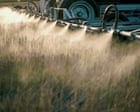
The ever-evolving landscape of environmental management continues to draw both concern and inspiration, with recent developments highlighting the complex interplay of agricultural practices and resource management. This article sheds light on the latest insights into the use of herbicides and innovative approaches to water supply challenges, offering a window into the mindful efforts taken to preserve both nature and community well-being.
Recent research has raised awareness about the potential implications of diquat, a widely used herbicide in the United States. While it serves as a replacement for glyphosate in products like Roundup, findings indicate that it could cause damage to both gut bacteria and essential organs. Notably, this discovery brings to the forefront the complex decisions nations face regarding agricultural chemicals. Diquat’s potential harm has led to its ban in several regions, including the UK, EU, and China, although it remains prevalent in American agriculture, particularly in vineyards and orchards. As regulatory bodies consider the implications of such findings, the research advocates for a balanced approach to ensure agricultural effectiveness without compromising human or ecosystem health.
Amid these agricultural contemplations, another pressing concern is the efficient management of water resources to ensure sustainable supply. The municipality of Nelas has exemplified proactive water management by utilizing fire trucks to meet its local water needs. This creative solution draws on the services of twelve volunteer firefighter units, reinforcing the value of community collaboration and innovation. Faced with water shortages, the region has demonstrated commendable resilience and adaptability, ensuring that its residents have access to essential water resources. This initiative not only highlights the ingenuity of local infrastructure planning but also serves as a reminder of the importance of preparedness in the face of environmental challenges.
These stories are united by a common theme: thoughtful responses to significant environmental challenges. They reflect the essence of mindful environmental stewardship and the need for research-backed, collaborative approaches to maintain ecological balance. As we contemplate these developments, it is essential to consider not only the potential risks that new data bring, such as those associated with herbicide use, but also to celebrate the innovative solutions that communities like Nelas bring forward. The thoughtful integration of science, policy, and community efforts exemplifies a path toward sustainable environmental management.
Within this harmonious alignment of science and community action lies a deep recognition of the interconnectedness of all living systems. Each decision made on herbicide regulation or water distribution policy reverberates through ecosystems, impacting not only the immediate environment but future generations’ ability to thrive. A mindful approach becomes the guiding principle as we strive for actions that benefit our planet and its inhabitants as a whole.
Furthermore, as organizations and communities forge these paths, there is beauty to be found in the mindful creation of resources that celebrate and preserve our natural world. The works of creative masters, such as those highlighted in the book “Madeira: Caleidoscópio Floral,” remind us of nature’s inspiring presence. The floral motifs captured within its pages symbolize the intricate, colorful tapestry of life that resiliently flourishes even amid challenges. Celebrating these creations brings an essential balance, encouraging both appreciation and proactive protection of our rich natural heritage.
The juxtaposition of scientific discovery, practical solutions, and cultural appreciation encapsulates a hopeful vision for the future—a world where informed decision-making and community action guide us towards harmony with nature. As we move forward, the mindful engagement of all stakeholders will remain instrumental in ensuring a sustainable and thriving environment for all. In this spirit, let us continue to explore, innovate, and celebrate, contributing to a world where nature and human ingenuity flourish hand in hand.
Source: {link}
